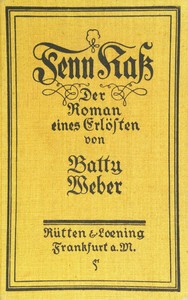Fenn Kaß : Der Roman eines Erlösten by Batty Weber
"Fenn Kaß : Der Roman eines Erlösten" by Batty Weber is a novel written in the early 20th century. The story follows a gifted village boy from Luxembourg, Fenn Kaß, as he leaves his rural Catholic world for a city seminary, torn between a priestly path and his fascination with machines. Around him move classmates Heine “Putty” Heinen and Fritz Lampert, a strict social order, and clergy who test and shape him,
painting a portrait of faith, class, and coming-of-age in a borderland community. It promises a humane, gently ironic study of vocation, friendship, and the pull between tradition and modern ambition. The opening of the novel lingers over the Luxembourg countryside, the village of Wiesing, and its faded prosperity before turning to Fenn, a Küster’s son, who hauls wood, secretly reads about steam engines, and prepares to depart for the Gymnasium and church-run boarding school. We meet the kindly Pfarrer Reining and his sister Gretchen, the practical teacher Braun and his daughter Marjänni, and Fenn’s two friends: dreamy, anxious Putty, and entitled Fritz from a declining farm family. An evening of small-town life unfolds—cards, bells, and a rough supper at Lampert’s—hinting at debts, pride, and social tensions. Fenn’s visit to the cobbler Pichert frames his inner conflict: priesthood for stability versus a maker’s urge to build machines. At dawn the boys ride to the city with the taciturn farmhand Wöllem, encounter a skeptical innkeeper and street taunts, and enter the Konvikt under the ink-splashed gaze of a plaster guardian angel. A fiery, domineering director receives them, alternately thundering about moral peril and cooing paternal assurances, while the mothers and fathers hover between awe and worry. The section closes with dorm assignments and a quiet moment in the park, where Fenn’s mother tries to slip him a small coin—an intimate gesture at the threshold of his new life. (This is an automatically generated summary.)
Read or download for free
Not sure how to start? Reading Guide
| Reading Options | Url | Size | |||
|---|---|---|---|---|---|
| Read now! | https://www.gutenberg.org/ebooks/76309.html.images | 523 kB | |||
| EPUB3 (E-readers incl. Send-to-Kindle) | https://www.gutenberg.org/ebooks/76309.epub3.images | 541 kB | |||
| EPUB (older E-readers) | https://www.gutenberg.org/ebooks/76309.epub.images | 539 kB | |||
| EPUB (no images, older E-readers) | https://www.gutenberg.org/ebooks/76309.epub.noimages | 484 kB | |||
| Kindle | https://www.gutenberg.org/ebooks/76309.kf8.images | 1.4 MB | |||
| older Kindles | https://www.gutenberg.org/ebooks/76309.kindle.images | 1.4 MB | |||
| Plain Text UTF-8 | https://www.gutenberg.org/ebooks/76309.txt.utf-8 | 475 kB | |||
| Download HTML (zip) | https://www.gutenberg.org/cache/epub/76309/pg76309-h.zip | 1.0 MB | |||
| There may be more files related to this item. | |||||
Similar Books
About this eBook
| Author | Weber, Batty, 1860-1940 |
|---|---|
| LoC No. | 13015697 |
| Title | Fenn Kaß : Der Roman eines Erlösten |
| Alternate Title | Fenn Kass : Der Roman eines Erlösten |
| Original Publication | Frankfurt a. M.: Ruetten und Loening, 1913. |
| Credits | Jens Sadowski and the Online Distributed Proofreading Team at www.pgdp.net |
| Reading Level | Reading ease score: 79.7 (7th grade). Fairly easy to read. |
| Language | German |
| LoC Class | PT: Language and Literatures: Germanic, Scandinavian, and Icelandic literatures |
| Subject | Luxembourg fiction (German) |
| Category | Text |
| EBook-No. | 76309 |
| Release Date | Jun 15, 2025 |
| Copyright Status | Public domain in the USA. |
| Downloads | 123 downloads in the last 30 days. |
| Project Gutenberg eBooks are always free! | |

